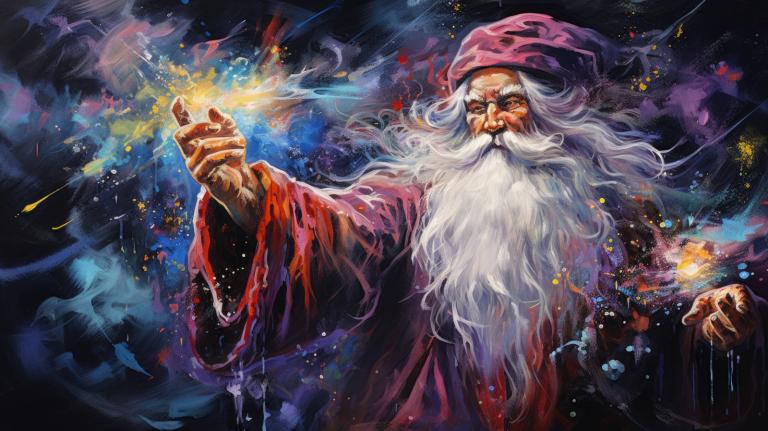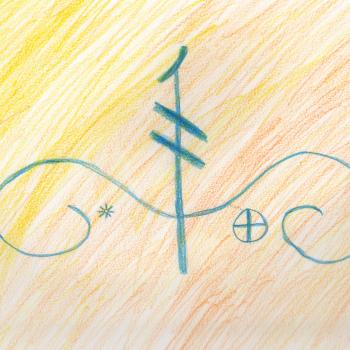Over the next turn of the “Wheel of the Year”, it’s my plan to investigate and pay respect to eight archetypes of mature, sacred masculinity.
Men’s mysteries matter. Today, young men are confronted on one hand with reactionary voices who advocate for gender roles decades or centuries out of date, and on the other with professional-managerial class “progressive” voices who seem to think the answer to the reactionaries is to eliminate masculinity.
The transition to manhood is dangerous. Men are both more likely than women to be murdered and to commit murder. We’re more likely to be in prison, to be killed on the job, or to commit suicide. We’re less likely to finish high school or earn college degrees.
Boys who fail to make a successful transition to manhood end up at best being a drag on society, and at worst an active threat to people’s lives. And we will not help them make the transition by denying that manhood even exists.
To help young men through the transition, a system of archetypes can be a useful guide. No such system will be complete, of course. What I’m going to talk about in this series of posts is inspired by the book King, Warrior, Magician, Lover by Robert Moore and Douglas Gillette, and also by Robert Bly’s work, but it’s my own thing. Anything smart is probably copied from those others and anything dumb here is probably my own fault.
By considering these archetypes I am not claiming that these roles are unavailable to women or nonbinary folks. Nor am I claiming that this is the only way to be a man. I’m offering some ideas that have helped me come to terms with my own existence as an adult male human being. (And cognizant that that is as a “white” heterosexual American male, though still believing there’s enough universality in the way androgens shape our brains for the exercise to be useful). If they don’t work for you, fine, please tell us your secrets! If you’re not a man and find something useful here anyway, great!
For each of these archetypes, we’re going to discuss a balanced version, an excess version, and a shadow version.
Visualize us going around a mountain: at the top is the Wild Man and the realm of excess, up where the air is thin. It’s exhilarating but we can’t stay there. At the bottom is the shadow realm of fear. The healthy mature man moves around the middle heights of the mountain, in neither shadow not excess, moving between the archetypes as needed. Over this series, we will visit eight points around the mountain: the Magician, the Healer, the Lover, the Preacher, the King, the Captain, the Warrior, and the Trickster.
The Magician

“TO KNOW, TO DARE, TO WILL, TO KEEP SILENCE – such are the four words of the Magus, inscribed upon the four symbolical forms of the sphinx.” Eliphas Lévi, Transcendental Magic
“When you know the fourfoil in all its seasons root and leaf and flower, by sight and scent and seed, then you may learn its true name, knowing its being: which is more than its use. What, after all, is the use of you? Or of myself? Is Gont Mountain useful, or the Open Sea?” Ogion went on a halfmile or so, and said at last, “To hear, one must be silent.” – A Wizard of Earthsea, Ursula LeGuin
The Magician is the keeper of hidden knowledge, the master of special skills and powers. He is the yin/yang compliment of the King. Where the King is a widely known public figure, the Magician is isolated in his tower, intent on his chosen field of study and artistry.
Consider an artist or writer or musician in his studio. A scientist in his lab. A carpenter or a tinkerer in his workshop. A student in his study carrel, a cook in his kitchen.
Now, the musician may manifest other archetypes when performing. But when practicing until his fingers are raw, or struggling to write a new song, the musician is sinking deeply into his craft, seeking to transform himself and to return with some new knowledge.
When Leonard Cohen wrote Hallelujah (a much-misunderstood song, but that’s a topic for another time), he was reduced to sitting in his underwear on the floor of his hotel room, banging his head against the floor as he filled notebooks with 80 verses. “To find that song, that urgent song, takes a lot of versions and a lot of work and a lot of sweat,” he said.
This is the way of the Magician: to leave the world (the social world) behind in order to sink deeply into one’s craft, to merge with it. In shamanistic societies this takes the form of the shaman’s trance, leaving behind even the body in order to sink deeply into the spirit realm.
The Magician is a listener more than a speaker (though he may write or otherwise create based on what he hears), a knower more than a do-er. And (in his archetypal form at least) he is motivated by knowledge and skill for its own sake.
The Magician knows that any skill can be a path to personal growth. As Robert Pirsig wrote about motorcycle maintenance, “The real cycle you’re working on is a cycle called ‘yourself’.”
We can see the Magician in characters like Merlin, Spock, Dumbledore, and Ged from Ursula LeGuin’s EarthSea novels. (His isolation ends when he gives up his magic at the end of The Farthest Shore and he becomes a householder in Tehanu.) Consider also Einstein, in our pop culture version of him, and other “absent-minded professor” types.
The Shadow: The Black Magician
The Black Magician also pursues knowledge and skill. But he seeks it not for its own sake, but from greed. He seeks not personal transformation and self-mastery, but mastery of others. He is the Master to the Magician’s Doctor, the Voldemort to Dumbledore.
While the Magician cares more about his craft than he does himself, the Black Magician sees his craft as a means of personal aggrandizement. He seeks not to leave the social world behind, but to rule over it.
The Excess: The Mad Scientist
The Mad Scientist pursues knowledge and skill, but his flaw is that he does not care about limits or cost.
Victor Frankenstein does not seek power or wealth, but he goes too far in his quest: “You seek for knowledge and wisdom, as I once did; and I ardently hope that the gratification of your wishes may not be a serpent to sting you, as mine has been.” His goal is to “unfold to the world the deepest mysteries of creation.”
But the Mad Scientist sees nothing as sacred, no area where he should tread most cautiously. And in the exhilaration of the realm of Excess he is likely to go beyond his own limits, as in the myth of the Sorcerer’s Apprentice, who invokes powers he is unable to control.
Even though the Mad Scientist does not seek mastery over others as a Black Magician does, ego often plays a role. While the Black Magician may be content to rule from behind the scenes, unknown, as long as he has power, the Mad Scientist wants to be known and acknowledged for his mastery.
The Magician at Midwinter
Here at the time when the world is at its darkest and most inward-turning, when we speak often of “the magic of Christmas,” when many artisans and crafters are busy creating works they intend to gift, it is a good time to honor the Magician.
It is no coincidence that the popular mythology of this time of year features a wise figure with superhuman perceptions (“he knows if you’ve been bad or good”) who spends almost all of his time crafting in a workshop, distant from direct contact with any other human being. (Though the popular meme that Santa Claus is based on ancient shamans has been well-debunked by our learned colleague Jason Mankey.)
Even the Christ story, for those who insist on putting the Christ into Christmas, features the three “Magi” (or maybe twelve, in some versions), who possessed secret knowledge of astrology and the interpretation of dreams, and were the first to pay homage to the young Jesus.
So take some time this season to consider your relationship with this archetype. What is your special knowledge or skill? Do you give yourself time and space to go away into your tower or workshop or studio and sink into your craft, and let it transform you so you can (later in the sequence) return to the world with something special?
Is your primary motivation in practicing your craft, for the sake of the craft itself?
Do you honor and acknowledge that your skill and knowledge has limits?
Evocation of the Magician
I evoke and call forth
The Magician within me
I honor and acknowledge
My skills and my knowledge
And the efforts I have put into mastery
I resolve to use my skills
For the benefit of all
Knowing my limits and taking heed of costs
I dedicate my practice
As a path of transformation and growth
I resolve to continue my efforts
To master my skills, and by doing so master myself
So mote it be.

















